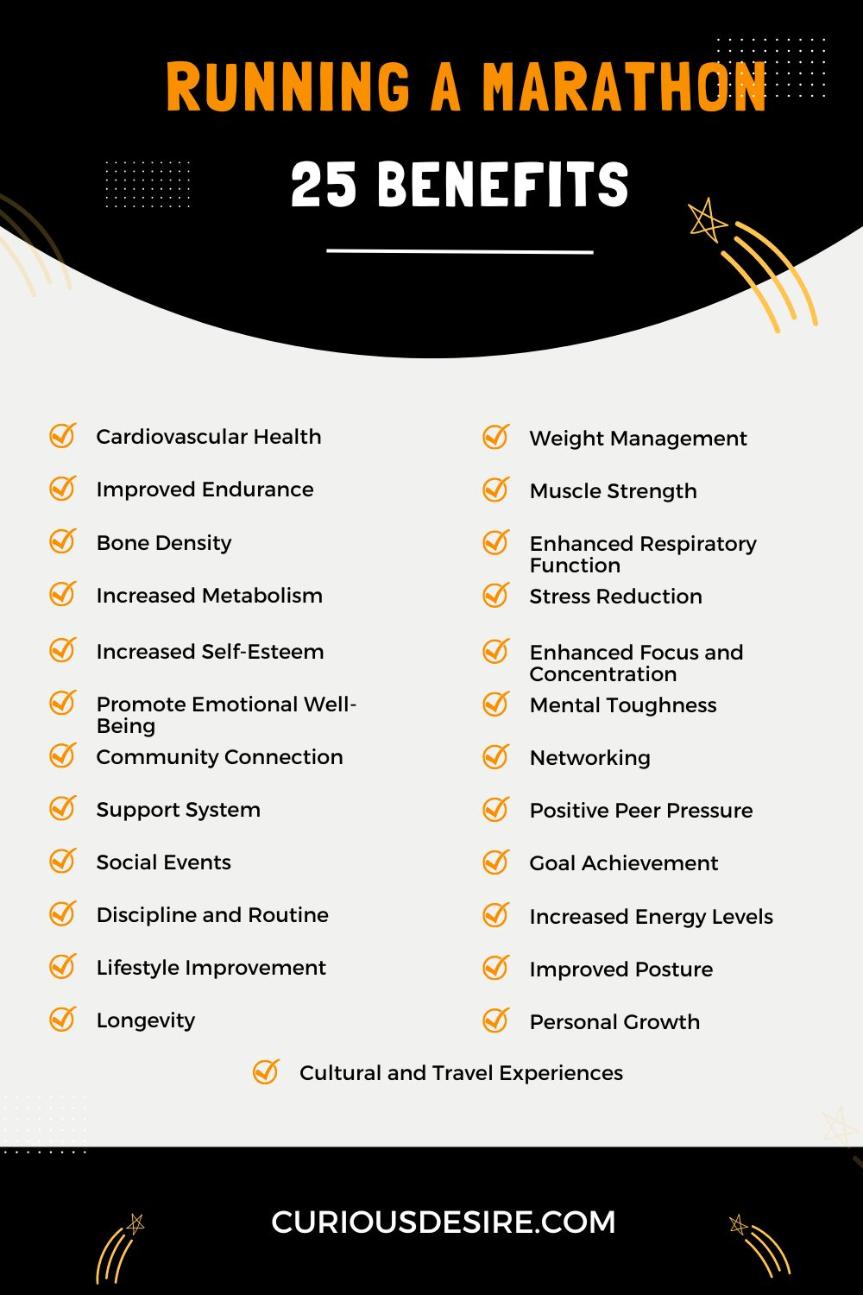Running a marathon goes beyond being a physical challenge; it’s a transformative experience with a multitude of benefits for your overall well-being.
In this article, we’ll uncover some of the incredible benefits that make running a marathon more than just a physical challenge.
Here are the top 5 benefits of running a marathon:
- Enhanced Respiratory Function
- Muscle Strength
- Promote Emotional Well-Being
- Networking
- Cultural and Travel Experiences
[toc]

Benefit 1: Cardiovascular Health
Engaging in marathon training proves to be a boon for your heart. As you consistently run long distances, your cardiovascular system receives a significant workout.
According to studies, running is an excellent means of conditioning the cardiovascular system.
Therefore, this helps in improving heart health and reducing the risk of heart disease. According to WebMD, runners lower their chances of dying from heart disease by half.
As the heart becomes more efficient in pumping blood, the entire circulatory system benefits from increased blood flow.
With every marathon stride, you are essentially giving your heart a powerful workout that contributes to a healthier and more robust cardiovascular system.
Benefit 2: Weight Management
Running marathons is an effective way to manage and maintain a healthy weight. Regular running is a calorie-burning activity that helps you shed excess pounds and prevent weight gain.
According to a chart from the American Council on Exercise, a 120-pound person burns about 11.4 calories per minute while running.
So if that person runs a 10-minute mile, they’ll burn 114 calories. If that person weighs 180 pounds, the calorie burn goes up to 17 calories per minute. The 180-pound runner would burn 170 calories running that same 10-minute mile (source).
However, it’s important to know that it’s not just about the calories burned during the run but also the long-term impact of regular marathon training on your metabolism, which aids in achieving and sustaining a healthy weight
Benefit 3: Improved Endurance
One of the standout advantages of marathon training is the significant improvement in endurance. As you gradually increase your running distances, your body adapts by enhancing its stamina.
This increased endurance becomes evident not only during marathons but also in everyday activities.
You’ll find that tasks requiring physical effort become more manageable, and you can engage in activities for more extended periods without feeling overly fatigued.
Benefit 4: Muscle Strength
Marathon running engages various muscle groups, providing a comprehensive workout for your entire body. The continuous and repetitive motion of running activates muscles.
According to Asics, during your running training, you will put the most stress on the muscles from your hips down, including your glutes, thighs, calf muscles, and so on.
This full-body engagement promotes overall muscle strength and toning.
The quadriceps, hamstrings, calves, and glutes in the legs, along with the core muscles, experience significant development, contributing to improved strength and endurance.
Benefit 5: Bone Density
Running, as a weight-bearing exercise, has a positive impact on bone density. The impact of each foot strike stimulates bone growth and strength.
This is particularly important in preventing conditions like osteoporosis, a health condition that weakens bones, making them fragile and more susceptible to breaks, according to the NHS.
Marathon training, with its consistent weight-bearing nature, plays a pivotal role in maintaining and enhancing bone density, promoting long-term bone health.
Benefit 6: Enhanced Respiratory Function
The respiratory system undergoes substantial improvement through marathon training.
As your body adjusts to the increased demand for oxygen during prolonged runs, the respiratory muscles strengthen, and lung capacity expands.
This enhanced respiratory function not only supports improved endurance during running but also contributes to overall respiratory health.
Benefit 7: Increased Metabolism
Regular marathon training provides a significant boost to your metabolism. The body becomes more efficient at burning calories, both during the run and at rest.
This increased metabolic rate aids in weight management and overall energy expenditure, contributing to a healthier and more balanced metabolism.
Benefit 8: Stress Reduction
Running marathons acts as a powerful stress-reduction tool. The release of endorphins, according to the Cleveland Clinic, helps relieve pain, reduce stress, and improve your sense of well-being.
The rhythmic motion of running also serves as a meditative practice, allowing runners to clear their minds and find solace in the simplicity of each stride
Benefit 9: Increased Self-Esteem
Benefit 10: Enhanced Focus and Concentration
Marathon training not only benefits the body but also the mind. Regular running has been linked to improved cognitive function, including enhanced focus and concentration.
The mental discipline required for marathon training, such as maintaining a steady pace and overcoming mental fatigue, contributes to improved cognitive abilities that extend beyond the running track.
Benefit 11: Promote Emotional Well-Being
Running serves as a healthy and constructive outlet for stress and frustration.
The act of running allows individuals to channel and release pent-up energy and tension, promoting emotional well-being.
The rhythmic and repetitive nature of running creates a therapeutic experience, helping individuals cope with the stresses of daily life.
Benefit 12: Mental Toughness
Marathon training is not just a physical challenge; it is a mental test of resilience and toughness.
Enduring long distances, pushing through physical fatigue, and overcoming mental barriers contribute to the development of mental toughness.
This newfound mental strength extends beyond running, positively influencing one’s approach to challenges in various aspects of life.
Benefit 13: Community Connection
Taking part in marathons brings people together and creates a strong sense of community. This feeling of togetherness goes beyond just the race day.
When people train together and work toward the same goal, it forms a special bond.
It doesn’t matter if you’re a seasoned marathon runner or trying it for the first time – being part of a group that gets what you’re going through adds extra support and motivation.
Benefit 14: Networking
Running events provide unique opportunities to expand your social circle and connect with like-minded individuals.
Whether you’re a solo runner or part of a running group, the shared passion for running serves as a natural conversation starter.
Networking during these events goes beyond business—it’s about forming connections with people who share a common interest in health, fitness, and the joy of running.
Benefit 15: Support System
The running community becomes a valuable support system during the ups and downs of marathon training.
Fellow runners understand the challenges and triumphs of the journey, providing a unique source of encouragement.
Whether it’s overcoming a training hurdle or celebrating a personal milestone, having a support system of like-minded individuals makes the entire experience more rewarding and enjoyable.
Benefit 16: Positive Peer Pressure
Being part of a running community introduces a positive form of peer pressure.
The collective commitment to training and the shared dedication to the marathon goal create an environment where individuals inspire each other to stay committed.
The encouragement from peers becomes a motivating force, encouraging a sense of accountability and determination to persevere through the training process.
Benefit 17: Social Events
Marathons extend beyond the race itself; they often include social activities and gatherings. These marathon events provide an opportunity for runners to come together, share experiences, and celebrate their achievements.
Whether it’s a pre-race pasta dinner, post-race festivities, or organized meet-ups, the social aspect adds a layer of enjoyment to the overall marathon experience, creating lasting memories and friendships.
Benefit 18: Goal Achievement
Finishing a marathon is a big personal accomplishment.
Going from that first training run to crossing the finish line is like proving to yourself that you’re dedicated and can stick with something tough.
It’s a major goal you’ve worked hard for.
The feeling of achievement you get from completing a marathon is a strong motivator and really boosts your confidence and how you see yourself.
Benefit 19: Discipline and Routine
Marathon training is a masterclass in discipline and the establishment of a healthy routine.
The commitment to regular training runs, cross-training, and rest days cultivates discipline.
The structured routine not only enhances physical fitness but also spills over into other aspects of life, promoting the organization and time management skills.
Benefit 20: Increased Energy Levels
Regular running, inherent in marathon training, has the remarkable ability to boost overall energy levels.
While it may seem counterintuitive, the expenditure of energy during running leads to increased vitality and endurance over time.
Runners often report feeling more alert, focused, and energized throughout the day, showcasing the positive impact of regular running on overall vitality.
Benefit 21: Lifestyle Improvement
Running, especially when training for a marathon, becomes a catalyst for lifestyle improvement.
The commitment to regular exercise encourages healthier choices in various aspects of life, from nutrition to sleep patterns.
The ripple effect of a running-focused lifestyle promotes positive habits and contributes to an overall improvement in well-being.
Benefit 22: Improved Posture
Marathon training brings about improvements in posture as a result of stronger muscles and increased awareness of body mechanics.
running is actually one of the best ways we can improve our posture.
The engagement of core muscles during running, coupled with overall muscle toning, contributes to better alignment and posture.
The focus on maintaining proper form while running carries over into daily activities, promoting a more upright and aligned posture.
Benefit 23: Longevity
Regular exercise, particularly the sustained commitment to marathon running, is associated with increased life expectancy.
The cardiovascular benefits, enhanced overall health, and positive impact on various bodily systems contribute to a longer and healthier life.
Marathon runners often experience improved longevity as a result of their dedication to regular physical activity.
Benefit 24: Personal Growth
The challenges presented in marathon training become a crucible for personal growth and resilience.
Overcoming the physical and mental hurdles of long-distance running gives a sense of accomplishment, self-discovery, and inner strength.
The journey from novice runner to marathon finisher becomes a transformative experience, shaping individuals into more resilient and self-assured versions of themselves.
Benefit 25: Cultural and Travel Experiences
Marathons are often held in various cities and scenic locations worldwide.
Running a marathon provides an opportunity to explore new places, experience different cultures, and connect with people from diverse backgrounds.
It combines the thrill of travel with the sense of accomplishment from completing a challenging race.
Running Marathon Benefits FAQs
How does running a marathon help?
Running a marathon improves cardiovascular health, enhances endurance, builds muscle strength, contributes to weight management, reduces stress, boosts mood, and fosters a sense of community.
Does a marathon burn fat?
Yes, running a marathon can contribute to fat burning as the body utilizes stored fat for energy during the run.
What does a marathon do to your heart?
Running a marathon strengthens the heart muscle, improves circulation, and enhances cardiovascular endurance, promoting overall heart health.
How does training for a marathon change your body?
Marathon training increases muscle strength, improves cardiovascular fitness, enhances lung capacity, and induces metabolic adaptations for better energy utilization.
How do you feel after running a marathon?
Post-marathon, individuals often feel a sense of accomplishment, euphoria, and pride, but may also experience physical exhaustion and muscle soreness.
How quickly do you lose fitness after a marathon?
Fitness levels can decline within a few weeks of reduced training, emphasizing the importance of maintaining consistent, moderate exercise.
What is the fastest way to recover from a marathon?
Effective recovery involves hydration, balanced nutrition, rest, gentle exercise, and stretching/mobility work to aid muscle recovery.
How fast does stamina increase?
Improvements in stamina can be observed within a few weeks to a couple of months with consistent, gradually increasing workout intensity and interval training.
How long does it take to get in shape for a marathon?
The time varies, but a typical marathon training program for beginners spans 16-20 weeks, with experienced runners requiring a shorter preparation period. Consistency and gradual progression are key.
